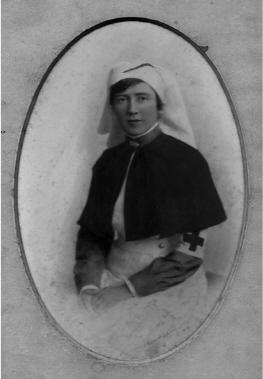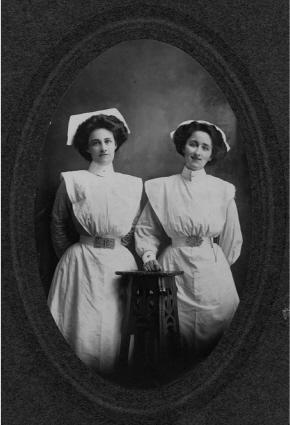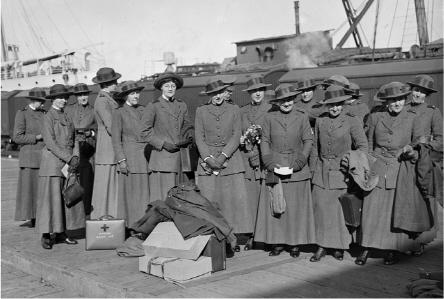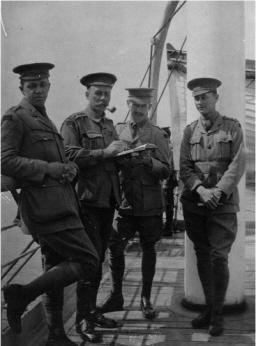The Other Anzacs (14 page)

Lottie did not stay at Port Said, but remained on the
Maheno
, bound for Gallipoli. In the Canal on the way to Port Said there had been French warships and troopships from India, Australia, Ceylon and Canada. Everyone they passed wanted to know where they were from. ‘New Zealand!’ they shouted in unison from the deck. The Canal was flanked with sandbags and barbed wire, and bands played as men marched on the shore. They saw some Australians, who sang
Tipperary.
‘The doctors and padre are tying bundles of papers and books up, ’ Lottie wrote. ‘As we pass they throw them in and the boys jump in after them.’
13
But there was something more important on her mind: she wanted to contact her brother, Leddie. She heard that the 5th Reinforcements, of which he was a member, had been under fire at Gallipoli, but there was no news of him. In Port Said she sent a cable to Alexandria ‘to see if I can hear anything of Leddie’.
Lottie wrote home that ‘the whole place seems full of wounded’, with ships arriving daily. ‘We hope to be at [the] Dardanelles now in [a] few days and are all busy with our final work. We can’t find out much New Zealand news, so have not heard of Leddie at all yet. May hear more from Alexandria.’
14
All Lottie knew was that the casualties were dreadful and ‘to see the wounded, well, it’s awful!’ The brother of a New Zealand doctor had lost both eyes, while a nurse’s brother had lost one leg and was likely to lose the other. ‘Fifth Reinforcements, they say, have suffered horribly.’
15
All Lottie could do was hope.
10
NONE OF THE OLD
SMALLNESS IN IT

For Alice Ross King, the
Ballarat
was a ship of sadness. Many of the invalided troops returning to Australia had had arms or legs amputated or were blind or deaf. Isolated in the front of the ship were 150 men with venereal disease who had come aboard at Suez. Of the total of 633 patients, just 160 were in cabins; the rest slept in hammocks.
When the ship left Alexandria on 29 June, Alice thought the wounded officers were ‘all very nice’ and were ‘prepared to make a fuss of us’. Her colleague Alice Martin ‘flirted with the officers most of the day and I had the work to do’. Another four nurses had joined the
Ballarat
at Suez. This had pleased the men, Alice Ross King noted, because they thought ‘something might happen interesting enough to pass the time’. But ‘the four were the most uninteresting and elderly girls one could strike in a bunch’. Alice was relieved, ‘because the nursing now will take first place instead of the flirting’. Nonetheless, she noted that she and Martin were ‘the popular favourites still with the officers’, a situation she clearly liked.
The ship’s company set out to buoy the spirits of the wounded, trying as best they could to help them forget their battlefield ordeals. A sports committee was formed and concerts were held. The first one made a deep impression on Alice, for it featured the ‘hearty singing of “Are we down hearted? No!” by the boys. It was touching to see them—blind and legless and armless ones all shouting “No!”’
1
Alice Martin was one of the sisters at her mess table. ‘Vulgar but clever with a loud voice which talks everybody down but she is always entertaining, ’ was Alice Ross King’s assessment. She was a keen observer of the people around her, among whom—also at her table—was the ship’s master, Captain F.W. Hanson, ‘a clean faced, great big man with beautiful honest brown eyes’. He was ‘steady and thoughtful, gentle mannered and manly’ with ‘no suspicion of flirtation’. He thought the world of his ‘dear wife and two children’. He was shy and was ‘the kind of man I would like to marry’.
Others at her table included several wounded officers, whose injuries were not always visible. The former commander of the 8th Battalion and, briefly, the 2nd Infantry Brigade at Krithia, Colonel William Kinsey Bolton, had had a nervous breakdown. At Krithia he had seen the 2nd Brigade lose almost a third of its men. Alice recorded what she heard about it: ‘He wept on the battlefield and was quite useless. He is an old campaigner but his nerve is completely gone.’ What made it worse for Bolton—described by Australia’s official war historian, C.E.W. Bean, as ‘a soft-hearted commander very solicitous for his men’—was that he had raised the battalion from rural Victoria. A hill and ridge on Gallipoli were named after him, yet just a few weeks earlier on 18 May, he had written a letter from Gaba Tepe to the commander of the AIF 1st Division:
I respectfully apply to be relieved of command and to be transferred to Intermediate Base Depot or Australia: I feel this would be in the best interests of the Service as the strenuous work of the last three weeks has been too much for a man of my years [he was fifty-three] and I am broken down in body and mind: the horrors and strain of 8th to 12th inst. at Aitchi Baba were more than I could stand, my nerve is completely gone, I have no confidence in myself and I shall never be able to take troops into action again, and I earnestly ask that this application be favourably considered.
2
While the military hierarchy was yet to acknowledge or fully understand combat trauma such as this, Alice saw its effects at close range. Lieutenant Arthur Priestley was ‘a neurotic Englishman’ from Western Australia whose first child had been born just four days after he left Australia for the front. ‘On the way out—they say he was one of the jolliest. Now he is really a nervous miserable wreck with no buck up in him. His horse rolled on him. He will probably develop into a chronic mental invalid.’
3
Another at her table was Captain Mervyn Herbert, a South Australian, who had been wounded in the left shoulder and had two fingers shot off.
Easily the most interesting man on the boat. He is running a newspaper on board which is full of clever things. He is very dark with peculiarly white teeth and brown sharp eyes that always make me think of a snake, they are so steady and glistening. He is an attractive man. On the surface he appears quick-witted, cutting and very smart. But underneath I feel that he is very, very lonely and hungry and very sensitive. A man with a lot of ambition and force but very little self content.
4
Lieutenant Joe Sparks from Queensland was twenty. His left forearm had been amputated, shrapnel had badly lacerated his feet and legs, and he was now permanently incapacitated. Alice clearly liked him, and saw him as ‘a brave little kid’.
Just promoted, he was throwing hand grenades on 19 May at Gaba Tepe when one exploded in his hand and another at his feet and blew him out. He was one of the first in bayonet charge and for two weeks was grenade throwing within 5 yards of Turk trenches. He is a very advanced kid, drinks his whiskey neat and is trying to drink himself to death.
5

Olive Haynes, a picture of Edwardian innocence, at her ‘coming out’ pre-1914. Little could she have known the horrors of war she would see just a few years later. (Photo courtesy of Margaret Young)

Elsie Cook sent this photo to her mother to mark her departure on the hospital ship
Kyarra
in December 1914. Years later, Elsie was the first nursing sister to join the RSL. (Photo courtesy of Hartley Cook)

Kath King (left) and her sister, Wynne King, in Orange before the outbreak of war. They both started their training at Orange Hospital. (Photo courtesy of John Carter)

Elsie Cook was one of the first nurses to leave Australia for war service when she sailed from Sydney in December 1914 on the
Kyarra
. These nurses are waiting to board the
Kyarra
, nearly three years later in 1917. (Photo courtesy of the Australian War Memorial PB0518)

With Gallipoli beckoning, Lieutenant Gordon Carter (left) stands on the deck of the troop ship
Minewasaka
. Alongside him are Major William Davidson, Lieutenant William Duchesne and Captain Albert McGuire. By 19 August 1915, he was the only one of the group alive. (Photo courtesy of John Carter)
